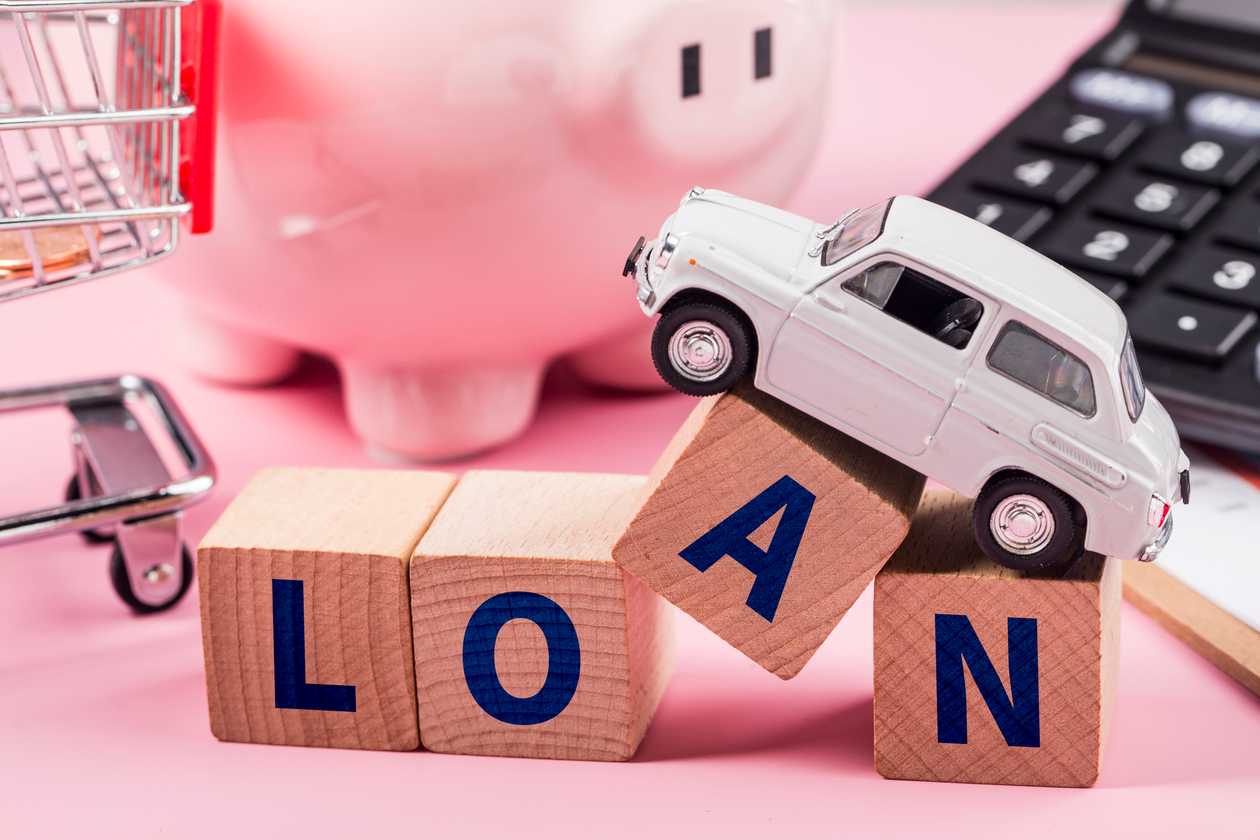

Finance
How To Apply For A Car Loan With No Credit
Modified: January 15, 2024
Learn how to apply for a car loan and secure financing with no credit history. Discover the best finance options available for your dream car.
(Many of the links in this article redirect to a specific reviewed product. Your purchase of these products through affiliate links helps to generate commission for LiveWell, at no extra cost. Learn more)
Table of Contents
- Introduction
- Understanding No Credit Car Loans
- Steps to Apply for a Car Loan with No Credit
- Check and Improve Your Credit Score
- Research and Compare Lenders
- Gather Necessary Documents
- Get Pre-approved for a Loan
- Find a Co-signer (if necessary)
- Shop for a Car
- Finalize the Loan Application
- Review and Sign the Loan Agreement
- Make Regular Loan Payments
- Conclusion
Introduction
Applying for a car loan can be an overwhelming process, especially if you have no credit history. However, having no credit shouldn’t discourage you from pursuing your dream of owning a car. Many lenders offer car loans specifically designed for individuals with no credit, providing them with an opportunity to establish a credit history or overcome a lack of credit experience. In this article, we will guide you through the steps to apply for a car loan with no credit and get closer to owning the car of your dreams.
Having no credit history means that lenders don’t have a track record to assess your creditworthiness. This can make them hesitant to lend you money, as they have no way of knowing if you will repay the loan on time. However, there are steps you can take to improve your chances of getting approved for a car loan, even with no credit history.
It’s important to note that while no credit car loans are available, they usually come with higher interest rates compared to loans for individuals with established credit. This is because lenders consider those with no credit as higher risk borrowers. However, with careful planning, research, and understanding of the loan application process, you can secure a car loan with favorable terms and start building your credit history.
In the following sections, we will outline the steps you need to take to apply for a car loan with no credit. These steps include checking and improving your credit score, researching and comparing lenders, gathering necessary documents, getting pre-approved for a loan, finding a co-signer if necessary, shopping for a car, finalizing the loan application, reviewing and signing the loan agreement, and making regular loan payments. By following these steps, you will increase your chances of getting approved for a car loan and will be on your way to owning a vehicle.
Understanding No Credit Car Loans
No credit car loans are specifically designed for individuals who have little to no credit history. These loans are available from various lenders, including banks, credit unions, and online lenders. They offer an opportunity for individuals without a credit history to obtain financing for a vehicle.
The absence of a credit history makes it challenging for lenders to assess your creditworthiness. Without a track record of borrowing and repaying loans, they have limited information to determine if you are a reliable borrower. As a result, lenders may be hesitant to provide you with a car loan or charge higher interest rates to compensate for the perceived higher risk.
No credit car loans can be a useful option for individuals who are just starting to build their credit or who have never borrowed money before. By successfully managing and repaying a no credit car loan, you can establish a positive credit history, which will benefit you in future loan applications for other purposes, such as mortgages or personal loans.
When applying for a no credit car loan, it’s essential to understand the terms and conditions set by lenders. Interest rates for these loans may be higher than those for borrowers with established credit. However, it’s crucial to shop around and compare offers from different lenders to secure the best possible interest rate and loan terms.
Additionally, it may be necessary to provide a down payment or find a cosigner to increase your chances of loan approval. A down payment demonstrates your commitment to the loan and reduces the lender’s risk, making them more likely to approve your application. A cosigner, on the other hand, is someone with an established credit history who agrees to take responsibility for the loan if you fail to make payments. A cosigner can help you qualify for a loan and potentially secure a lower interest rate.
Before applying for a no credit car loan, it’s essential to set a realistic budget. Consider not only the monthly loan payment, but also other costs associated with owning a car, such as insurance, maintenance, and fuel expenses. Having a clear understanding of your financial capabilities will help ensure that you choose a loan that you can comfortably repay.
No credit car loans can be a valuable tool for individuals looking to establish credit or overcome a lack of credit history. By carefully considering your financial situation, comparing lenders, and understanding the loan terms, you can navigate the process of obtaining a no credit car loan and take a significant step towards owning your dream vehicle.
Steps to Apply for a Car Loan with No Credit
Applying for a car loan with no credit may seem daunting, but with proper preparation and understanding of the process, you can increase your chances of approval. Here are the essential steps to follow:
-
Check and Improve Your Credit Score
Although you may not have a credit history, it’s still beneficial to check your credit score. This will give you an idea of where you stand and identify any errors or discrepancies that need to be addressed. While you can’t improve your credit score overnight, paying bills on time and reducing existing debts can positively impact your score.
-
Research and Compare Lenders
When it comes to no credit car loans, it’s crucial to research and compare different lenders to find the most favorable terms. Look for lenders who specialize in working with individuals with no credit or limited credit history. Compare interest rates, loan terms, and customer reviews to make an informed decision.
-
Gather Necessary Documents
Before applying for a car loan, gather all the essential documents lenders may require. This may include proof of income, employment verification, identification documents, and references. Having these documents ready in advance will streamline the application process.
-
Get Pre-approved for a Loan
Consider getting pre-approved for a car loan before visiting a dealership. This process involves submitting an application to a lender who will evaluate your financial situation and determine the loan amount you can qualify for. Pre-approval gives you a realistic budget and increases your negotiating power when shopping for a car.
-
Find a Co-signer (if necessary)
To enhance your chances of loan approval, especially if you have no credit history, consider finding a trusted family member or friend with a good credit score to act as a co-signer. A co-signer agrees to share the responsibility of the loan and can improve your chances of getting approved or securing a lower interest rate.
-
Shop for a Car
Once you have pre-approval or know your budget, it’s time to start shopping for a car. Consider your needs, preferences, and affordability when choosing a vehicle. Take your time to research different makes and models, compare prices, and consider both new and used options.
-
Finalize the Loan Application
Once you have selected a car, finalize the loan application with the lender of your choice. Provide all necessary documentation and complete the application accurately. Be prepared for the lender to conduct a thorough review of your financial history and employment details.
-
Review and Sign the Loan Agreement
Carefully review the loan agreement before signing it. Ensure you understand all terms and conditions, including the interest rate, repayment schedule, and any additional fees. Seek clarification from the lender if you have any questions or concerns.
-
Make Regular Loan Payments
Once the loan is approved and you have purchased the car, make your payments on time each month. Consistently paying off your car loan will help establish a positive credit history and improve your credit score for future financial endeavors.
By following these steps, you can navigate the process of applying for a car loan with no credit. Remember to research and compare lenders, gather necessary documents, consider a co-signer if needed, and make regular loan payments. Building a positive credit history through responsible borrowing will open doors to better financial opportunities in the future.
Check and Improve Your Credit Score
When applying for a car loan with no credit history, it’s important to know where you stand by checking your credit score. While you may not have a credit history, reviewing your credit score will provide valuable insights and help you understand how lenders may perceive your creditworthiness.
Start by obtaining a free copy of your credit report from each of the major credit bureaus – Equifax, Experian, and TransUnion. Review the report carefully to ensure there are no errors or discrepancies. If you identify any inaccuracies, it’s crucial to dispute them with the respective credit bureau to have them corrected.
In the absence of a credit history, your credit score may be low or even nonexistent. However, there are ways to improve your credit score over time, even without prior credit activity. Consider the following steps to boost your creditworthiness:
-
Pay Bills on Time
One of the most crucial factors in building a positive credit history is paying your bills on time. Payment history accounts for a significant portion of your credit score. Set up automatic payments or reminders to ensure you never miss a due date.
-
Reduce Existing Debt
If you have any outstanding debts, such as credit card balances or student loans, focus on reducing or eliminating them. Lowering your debt-to-income ratio demonstrates financial responsibility and can positively impact your credit score.
-
Establish a Savings Account
While not directly related to your credit score, having a savings account showcases your ability to manage your finances. It also provides a safety net for unexpected expenses and demonstrates stability to lenders.
-
Apply for a Secured Credit Card
If you are having trouble getting approved for a traditional credit card, consider applying for a secured credit card. A secured credit card requires a cash deposit that serves as collateral for the credit limit. By using a secured credit card responsibly and making on-time payments, you can begin building a positive credit history.
-
Limit New Credit Applications
Avoid applying for multiple lines of credit or loans in a short period. Each time you apply for credit, it generates a hard inquiry on your credit report, which can temporarily lower your credit score. Limit your credit applications to only essential ones.
Remember that building credit takes time, so be patient and consistent in your efforts. While it may not be possible to improve your credit score significantly before applying for a car loan, implementing these practices will lay a foundation for future creditworthiness.
By checking your credit score and taking steps to improve it, you can demonstrate to lenders that you are a responsible borrower, even with no credit history. This will increase your chances of getting approved for a car loan and potentially securing more favorable terms and interest rates.
Research and Compare Lenders
Once you have assessed your credit score and taken steps to improve it, the next step in applying for a car loan with no credit is to research and compare lenders. It’s important to find a lender that specializes in working with individuals who have limited or no credit history.
Start by researching different lenders, including banks, credit unions, and online lenders. Look for those that explicitly offer car loans for individuals with no credit. You can also seek recommendations from friends, family, or trusted financial advisors who may have experience with these types of lenders.
When comparing lenders, consider the following factors:
-
Interest Rates
Interest rates can significantly impact the overall cost of your car loan. Lenders may charge higher interest rates for individuals with no credit history, as they are considered higher-risk borrowers. However, it’s still important to compare rates among different lenders to find the most competitive offer.
-
Loan Terms
Examine the loan terms offered by each lender. This includes the length of the loan (typically measured in months), the monthly payment amount, and any additional fees or charges. Consider how these terms align with your budget and financial goals.
-
Customer Reviews
Reading reviews and feedback from other customers can provide valuable insights into a lender’s reputation and customer service. Look for lenders with positive reviews and a solid track record of working with borrowers who have no credit history.
-
Flexibility in Loan Approval
Some lenders may be more flexible than others when it comes to approving loans for individuals with no credit. Look for lenders who are willing to work with you, considering factors beyond just your credit history. They may take into account your income, employment stability, and ability to make regular loan payments.
-
Additional Services or Benefits
Consider whether the lender offers any additional services or benefits. This could include educational resources to help you better understand the loan process, tools to manage your payments online, or loyalty programs that could provide benefits in the future. These additional services can enhance your overall experience with the lender.
Make a list of potential lenders and compare their offerings side by side. Take the time to review and understand the terms and conditions of each lender before making a decision. Remember, obtaining a car loan is a significant financial commitment, so it’s important to choose a lender that aligns with your needs and goals.
By conducting thorough research and comparing lenders, you increase your chances of finding the right lender who can provide a car loan that suits your financial situation, even without a credit history.
Gather Necessary Documents
Before applying for a car loan with no credit, it’s essential to gather all the necessary documents that lenders may require. Having these documents ready in advance will streamline the application process and increase your chances of approval. While specific requirements may vary among lenders, the following are commonly requested documents:
-
Proof of Identity
You will typically need to provide a valid form of identification, such as a driver’s license, passport, or state ID card. Ensure that your identification document is up-to-date and matches the information you will provide in the loan application.
-
Proof of Income
Lenders will request proof of income to assess your ability to repay the loan. This may include recent pay stubs, employment verification letter, or tax returns if you are self-employed. The documents should clearly indicate your income, employment status, and length of employment.
-
Bank Statements
Lenders may require bank statements to verify your financial stability and assess your ability to make loan payments. Provide bank statements showing your savings, checking, and any investment accounts you may have. These statements should cover a few months and demonstrate regular income and responsible financial management.
-
Proof of Residence
You will need to verify your residential address through documents such as utility bills, lease agreements, or mortgage statements. Ensure that your proof of residence clearly displays your name and current address.
-
References
Some lenders may request personal or professional references to support your loan application. Provide contact information for individuals who can vouch for your character, stability, and ability to make loan payments.
-
Vehicle Information
If you have already selected a car, you may need to provide information about the vehicle, including the make, model, year, and identification number (VIN). This allows the lender to assess the value and condition of the car.
Always check with the specific lender you are applying with to ensure you have all the necessary documentation. Keep in mind that the required documents may vary depending on the lender’s policies and the type of loan you are seeking.
Organize your documents neatly and keep them in a safe place. Having them readily available will make the loan application process smoother and faster. Providing the required documents promptly demonstrates your preparedness and commitment to the loan, increasing your chances of approval.
By gathering the necessary documents ahead of time, you can ensure a smooth and efficient application process when applying for a car loan with no credit. Being well-prepared will help you present yourself as a responsible and reliable borrower to lenders.
Get Pre-approved for a Loan
Getting pre-approved for a car loan is a valuable step in the process of applying for a car loan with no credit. Pre-approval provides you with a clear understanding of your budget and strengthens your position when negotiating with car dealerships. Here’s how to get pre-approved for a loan:
-
Gather Your Financial Information
Before approaching lenders for pre-approval, gather your financial information, including proof of income, employment history, and any documentation related to your assets and liabilities. Being prepared will streamline the pre-approval process.
-
Research and Select Lenders
Research and compare different lenders who offer pre-approval for car loans. Look for lenders that specialize in working with individuals who have no credit history. Consider their interest rates, terms, and reputation in the industry.
-
Submit a Pre-approval Application
Contact the chosen lender(s) and submit a pre-approval application. You may need to provide personal information, financial details, and the loan amount you are seeking. The lender will evaluate your application and conduct a credit check to determine your eligibility.
-
Review the Pre-approval Offer
Once the lender has reviewed your application, they will provide you with a pre-approval offer. This offer will outline the maximum loan amount you qualify for, the interest rate, loan term, and any additional conditions.
-
Evaluate the Terms and Conditions
Carefully review the terms and conditions of the pre-approval offer. Consider factors such as the interest rate, monthly payment amount, loan term, and any fees or penalties that may apply. Ensure that the terms align with your budget and financial goals.
-
Shop for a Car
Having a pre-approval letter in hand gives you a realistic budget when shopping for a car. You can confidently explore different car options knowing how much you can afford and negotiate better deals. Keep in mind that the pre-approval offer may have an expiration date, so be mindful of the timeframe.
-
Finalize the Loan Application
Once you have selected a car, finalize the loan application with the lender of your choice. Provide any additional documentation required and complete the application accurately. The lender will review your application and vehicle information before finalizing the loan.
By getting pre-approved for a car loan, you have a clear understanding of your budget and can confidently shop for a car within your financial means. Pre-approval also demonstrates to car dealerships that you are a serious buyer, potentially improving your negotiating power and securing better terms for your loan.
Keep in mind that pre-approval is not a guarantee of final loan approval. The lender will conduct a more thorough review of your application and the vehicle’s details before finalizing the loan. However, pre-approval sets a solid foundation for the loan application process and increases your chances of getting approved for a car loan with no credit.
Find a Co-signer (if necessary)
Finding a co-signer can be a helpful step when applying for a car loan with no credit. A co-signer is someone who agrees to share the responsibility of the loan with you and is willing to guarantee your repayment if you default on the loan. Having a co-signer can increase your chances of getting approved for a loan and potentially result in better loan terms, such as a lower interest rate. Here’s what you need to consider when finding a co-signer:
-
Choose a Co-signer with Established Credit
When selecting a co-signer, look for an individual who has a solid credit history and a good credit score. Lenders prefer co-signers with a strong credit profile as it mitigates their risk. Banks, credit unions, or online lenders may have specific requirements for co-signers, so check with the lender to ensure the co-signer is eligible.
-
Seek a Trustworthy and Willing Co-signer
It’s important to find a co-signer who is trustworthy, reliable, and willing to take on the responsibility of the loan. This person should have a stable income and a good track record of managing their financial obligations. Openly discuss the obligations, responsibilities, and potential risks with the co-signer before proceeding.
-
Understand the Co-signer’s Role and Liability
Make sure both you and the co-signer understand the extent of their involvement as a co-signer. They will be equally responsible for repaying the loan if you default. This means any missed payments or defaults will also impact their credit score. It’s essential to have open and honest communication with your co-signer throughout the loan repayment process.
-
Communicate and Establish Trust
Maintaining a strong relationship with your co-signer is crucial. Keep them informed about your loan progress, payment schedule, and any changes in your financial situation. Clear communication and transparency will ensure both parties are on the same page and can work together effectively.
-
Release the Co-signer, if Possible
Some lenders offer the option to release the co-signer from the loan obligation after a certain period of consistent payments and a positive credit history. This can be a goal to work towards, providing the co-signer with eventual relief from their responsibility.
It’s important to note that finding a co-signer is not always feasible for everyone. If you are unable to secure a co-signer, there are still ways to obtain a car loan with no credit. Research lenders that specialize in working with individuals who have limited credit history or explore other options such as obtaining a secured loan or building credit through other means.
Remember, having a co-signer can provide valuable support when applying for a car loan with no credit, but it also comes with shared responsibility. Make sure to carefully consider all aspects and potential implications before involving a co-signer in your loan application.
Shop for a Car
Once you have been pre-approved for a car loan or have a clear understanding of your budget, it’s time to shop for a car that fits your needs and financial capabilities. Shopping for a car can be an exciting experience, but it’s important to approach it with careful consideration and research. Here are some steps to follow when shopping for a car:
-
Identify Your Needs
Consider your lifestyle, budget, and preferences to determine what type of car will best suit your needs. Think about factors such as size, fuel efficiency, safety features, and any specific requirements you may have.
-
Set a Realistic Budget
Based on your pre-approval amount or budget, establish a realistic budget for your car. Consider not only the purchase price, but also ongoing costs such as insurance, maintenance, and fuel expenses. Remember to leave room in your budget for unexpected expenses.
-
Research Different Makes and Models
Research various car makes and models that align with your needs and budget. Consider factors such as reliability, safety ratings, resale value, and ownership costs. Take advantage of online resources, car review websites, and customer reviews to gather information and make informed decisions.
-
Consider New vs. Used Cars
Decide whether you want to buy a new or used car. New cars offer the latest features, warranties, and peace of mind, but they come with a higher price tag. Used cars may be more affordable but require thorough inspection and research to ensure their condition and reliability.
-
Visit Multiple Dealerships
Visit different dealerships to compare prices, negotiate, and get a feel for the car-buying process. Take note of any promotions, discounts, or incentives that may be available. Don’t be afraid to negotiate the price and terms to ensure you get the best deal possible.
-
Take the Car for a Test Drive
Always test drive a car before making a purchase. This allows you to get a feel for the vehicle, check for any potential issues, and ensure that it meets your expectations in terms of comfort and performance. Pay attention to factors such as handling, acceleration, braking, and overall driving experience.
-
Get a Vehicle History Report
If you are considering a used car, obtain a vehicle history report to check for any previous accidents, ownership history, and maintenance records. This will help you make an informed decision and ensure that you are not purchasing a car with hidden issues.
-
Consider Financing Options
When finalizing your car purchase, consider the financing options available to you, including the loan terms, interest rates, and repayment schedule. Compare offers from different lenders to secure the most favorable financing terms for your car loan.
Remember, buying a car is a significant financial decision, and it’s important to take your time and make informed choices. Don’t rush into a purchase and be prepared to walk away if the deal doesn’t meet your expectations or budget. By carefully considering your needs, researching different makes and models, and comparing prices and financing options, you can find a car that meets your needs and fits within your financial means.
Finalize the Loan Application
Once you have found a car that meets your needs and fits your budget, it’s time to finalize the loan application with the chosen lender. This step involves submitting all the necessary documentation and completing the application accurately. Here’s what you need to consider when finalizing the loan application:
-
Gather Required Documents
Compile all the required documents that the lender has requested. This may include proof of identification, proof of income, proof of residence, and any other necessary documentation. Double-check that you have all the necessary paperwork to avoid delays in the application process.
-
Complete the Application Form
Carefully complete the loan application form, ensuring that all the information provided is accurate and up to date. Pay close attention to details such as the loan amount, desired term, and interest rate, as well as any additional preferences or requests you may have.
-
Review the Loan Agreement
Carefully review the loan agreement, which outlines the terms and conditions of the loan. Pay attention to details such as the interest rate, monthly payment, loan term, any additional fees or charges, and any special provisions that may apply. Seek clarification from the lender if you have any questions or concerns.
-
Provide Required Vehicle Information
If you have already selected a car, you will need to provide the lender with information about the vehicle, such as the make, model, year, and identification number (VIN). This allows the lender to assess the value and condition of the car for loan approval and insurance purposes.
-
Submit the Application
Once you have completed all the necessary steps and reviewed the loan agreement, submit the loan application to the lender. Ensure that you have included all the required documents and that the application is accurate and complete.
-
Wait for Loan Approval
After submitting the loan application, the lender will review your information, assess your creditworthiness, and determine whether to approve the loan. This process may take some time, so be patient and await the lender’s decision.
During this stage, it’s important to maintain open communication with the lender. Respond promptly to any requests for additional documents or information to avoid unnecessary delays in the loan approval process.
Once the loan application is approved, you will be one step closer to financing your car purchase. The lender will provide you with information regarding the disbursement of funds and the next steps to finalize the loan.
Remember to carefully review all the loan documents and seek clarification if anything is unclear before signing the agreement. Taking the time to understand the terms and conditions and asking questions will ensure that you are making an informed decision and entering into a loan agreement that meets your needs.
By completing the loan application accurately and providing all the necessary information and documentation, you increase your chances of a smooth and successful loan approval process, bringing you closer to driving away in your new car.
Review and Sign the Loan Agreement
After your car loan application has been approved, the next step is to review and sign the loan agreement. The loan agreement outlines the terms and conditions of the loan, including the interest rate, loan amount, repayment schedule, and any additional fees or charges. It’s essential to review this document carefully before signing to ensure you fully understand your obligations and rights as a borrower. Here’s what you need to consider when reviewing and signing the loan agreement:
-
Read the Agreement Thoroughly
Take the time to read the loan agreement thoroughly, paying close attention to each section. Understand the interest rate, whether it is fixed or variable, and the method of calculating interest. Note any repayment penalties, such as prepayment fees or late payment charges.
-
Understand the Repayment Schedule
Review the repayment schedule to understand the frequency and amount of each payment. Make sure it aligns with your budget and financial capabilities. If you have any concerns or questions, reach out to the lender for clarification.
-
Take Note of Additional Fees or Charges
Determine if there are any additional fees or charges associated with the loan, such as origination fees or documentation fees. Ensure that you are aware of these costs and consider them collectively when evaluating the total expense of the loan.
-
Clarify Loan Terms and Conditions
If there are any terms or conditions within the loan agreement that you do not fully understand, seek clarification from the lender. It’s crucial to have a clear understanding of your rights and obligations as a borrower to avoid any confusion or misunderstandings in the future.
-
Assess Insurance Requirements
Some lenders may require specific insurance coverage for the car, such as comprehensive and collision insurance. Understand the insurance requirements outlined in the loan agreement and ensure that you can meet these requirements.
-
Consult with Legal and Financial Professionals
If you have any doubts or concerns about the loan agreement, consider seeking advice from legal or financial professionals. They can help you review the document, identify any potential pitfalls, and ensure that you are making an informed decision.
-
Sign the Loan Agreement
Once you have thoroughly reviewed the loan agreement and are satisfied with the terms and conditions, it’s time to sign the document. Ensure that you provide your signature as instructed, either physically or electronically, and retain a copy of the agreement for your records.
By diligently reviewing and understanding the loan agreement before signing, you are protecting your interests as a borrower. If you come across any discrepancies or concerns, communicate with the lender and request amendments or explanations. Taking the time to review the agreement will provide you with peace of mind and ensure a smooth loan repayment process.
Remember, the loan agreement is a legally binding document, so it’s essential to review it carefully and seek advice if needed. Once you have signed the loan agreement, you are committing to fulfilling your obligations as outlined in the document, including making regular loan payments and adhering to the terms and conditions set by the lender.
Make Regular Loan Payments
Making regular loan payments is a crucial responsibility for any borrower, especially when you have obtained a car loan with no credit history. Consistently making your loan payments on time not only ensures that you stay on track with your repayment schedule but also contributes to building a positive credit history. Here are some key points to keep in mind when making loan payments:
-
Create a Budget
Develop a budget that includes your loan payments as a fixed expense. Allocate sufficient funds each month to cover your loan payment along with other essential expenses. This will help you manage your finances effectively and ensure that you have the necessary funds for timely loan repayment.
-
Set Up Automatic Payments
Consider setting up automatic payments with your bank or lender. Automatic payments ensure that your loan installment is deducted from your account on the specified due date. This eliminates the chance of missing a payment and helps you avoid late fees or penalties.
-
Keep Track of Due Dates
Stay aware of your loan payment due dates to ensure you do not miss any payments. Mark the due dates on your calendar or set reminders on your phone. Promptly address any changes in payment schedules or due dates communicated by your lender.
-
Pay Extra When Possible
Whenever you can, consider making extra payments towards your loan. This can help reduce the overall interest paid and enable you to pay off the loan sooner. Before making additional payments, confirm with your lender if there are any prepayment penalties or if the extra payment will go towards reducing the principal balance.
-
Keep Communication Open
If you encounter any financial hardships that may affect your ability to make loan payments, it’s crucial to communicate with your lender. They may offer temporary solutions or alternative payment arrangements to help you through a difficult period. Ignoring the situation or missing payments without communication can harm your credit and put you at risk of defaulting on the loan.
-
Maintain a Positive Credit History
Consistently making loan payments on time contributes to building a positive credit history. Your on-time payments will be reported to credit bureaus, which demonstrates your financial responsibility and can improve your credit score over time. A strong credit history will benefit you in future credit applications and potentially result in more favorable loan terms.
Making regular loan payments is not only a financial obligation but also an opportunity to establish a positive credit history. By responsibly managing your loan repayment, you can build a solid foundation for your future financial endeavors and demonstrate your creditworthiness to potential lenders.
If you encounter any challenges or changes in your financial situation that could impact your ability to make loan payments, proactively reach out to your lender. They may be able to provide guidance or explore potential repayment options to help you stay on track and maintain a positive relationship with them.
Remember, a car loan is a long-term commitment, and making timely payments is essential for successful repayment and establishing a positive credit history. By prioritizing your loan payments and practicing responsible financial habits, you can fulfill your obligations and increase your financial stability.
Conclusion
Applying for a car loan with no credit history may seem daunting, but with careful planning and research, it is certainly possible to secure financing for your dream car. Understanding the steps involved in the process and taking proactive measures to improve your creditworthiness can greatly increase your chances of loan approval and favorable terms.
Start by checking your credit score and taking steps to improve it. Paying bills on time, reducing existing debts, and establishing a savings account are all important factors in building a positive credit history. Research and compare lenders who specialize in providing car loans to borrowers with no credit. Take into account interest rates, loan terms, and customer reviews to make an informed decision.
Gathering all necessary documents in advance can streamline the loan application process and demonstrate your preparedness to the lenders. Consider finding a co-signer if necessary, someone with established credit who can vouch for your ability to repay the loan. Ensuring open communication and trust with the co-signer is crucial throughout the loan repayment process.
Shopping for a car requires careful consideration of your needs, budget, and preferences. Conduct thorough research on different makes and models, visit multiple dealerships, and take the car for a test drive before making a final decision. Once you have found the right car, finalize the loan application, review and sign the loan agreement, and then make sure to meet your loan payment obligations on time.
Remember that applying for a car loan with no credit is an opportunity to establish a positive credit history. By making regular loan payments and managing your loan responsibly, you are not only fulfilling your financial obligations but also building a solid credit foundation for future borrowing needs.
Lastly, remain proactive in managing your finances, communicating with your lender, and seeking professional advice when needed. By following these steps and staying committed to responsible financial practices, you can successfully navigate the process of applying for a car loan with no credit, and ultimately drive away with the car of your dreams.














